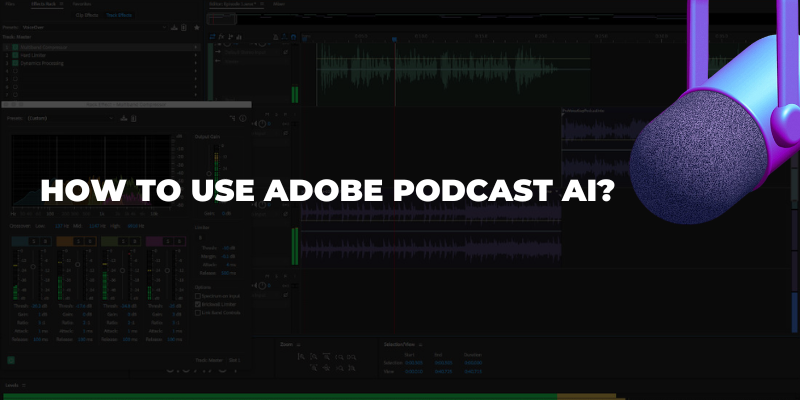These days Artificial Intelligence is growing. Now they are coming in a podcast. Are you a podcaster struggling to edit audio recordings to sound good and professional? Look no further than Adobe Podcast AI, a comprehensive editing tool that simplifies the podcast production process. This article will guide you through the steps to use Adobe Podcast AI effectively.
Understanding Adobe Podcast AI
Adobe Podcast AI is an all-in-one solution that enables you to record, edit, mix, master, and export podcast episodes. It makes the editing process more efficient, saving you time and effort.
Benefits of Using Adobe Podcast AI
Apart from its time-saving capabilities, Adobe Podcast AI offers a variety of other benefits:
- User-friendly interface
- Advanced audio editing capabilities
- Audio restoration tools to improve sound quality
- Exporting audio in different formats
- Fully integrated with Adobe Creative Cloud
Step 1: Getting Started with Adobe Podcast AI
Before you can start using Adobe Podcast AI, you must install it on your computer and ensure that your system meets the necessary requirements.
Adobe Podcast AI Installation Process
To install Adobe Podcast AI:

Search for Adobe Podcast AI in the search bar and click Install.
Once the installation process is completed, Adobe Podcast AI will appear in your Creative Cloud app.
System Requirements for Adobe Podcast AI To run Adobe Podcast AI on your computer, you must have:
- Windows 10 or later
- Mac OS X 10.14 or later
- Minimum 8GB RAM (16GB recommended)
- 2GB of available storage space for the installation
Step 2: Creating a New Project with Adobe Podcast AI
Once you have Adobe Podcast AI installed on your computer, it’s time to create a new project.
To create a new project:

Open Adobe Podcast AI and select “New Project” from the File menu.

Enter a name for your project and select a location to save it. Choose your desired settings for the project, including the sample rate, bit depth, and channels.
Setting up Project Preferences
It is essential to set up your project preferences to ensure that they match your recording settings. This avoids any mismatched configurations that may affect the audio quality.
Step 3: Recording Audio with Adobe Podcast AI
Now that your project is set up, it’s time to start recording.
How to Record Audio in Adobe Podcast AI
Connect your microphone to your computer.
Select “Record” from the “File” menu.
Select your desired input source and click “Record.”


Once you have finished recording, hit “Stop.”
Selecting and Configuring Audio Settings

While recording, make sure to select the desired audio settings to maintain consistency throughout the project.
Step 4: Editing Audio in Adobe Podcast AI
After recording your audio, it’s time to edit it.
How to Edit Audio Tracks in Adobe Podcast AI
Select the desired track and click on it.
Cut, trim, or split audio clips as needed using the basic audio editing tools.

Basic Audio Editing Tools in Adobe Podcast AI
Adobe Podcast AI provides a range of basic audio editing tools, including trimming, fading, and adjusting volume.

Step 5: Mixing and Mastering Audio in Adobe Podcast AI
After editing your audio files, it’s time to mix and master them to sound professional.
Understanding the Mixing and Mastering process in Adobe Podcast AI

Mixing involves balancing the levels of different audio elements, while mastering enhances the overall audio quality.
Audio Effects in Adobe Podcast AI
Adobe Podcast AI offers a range of audio effects to improve the audio quality further.
Step 6: Adding Transitions and Sound Effects in Adobe Podcast AI
Adding transitions and sound effects helps make your podcast sound professional and polished.
Adding Transitions between Audio Clips in Adobe Podcast AI

Adobe Podcast AI provides a range of transitions to choose from, including fade-ins, fade-outs, and crossfades.
Using Sound Effects in Adobe Podcast AI
Adobe Podcast AI has an extensive library of sound effects that you can use to enhance your audio files.
Step 7: Enhancing Audio Quality in Adobe Podcast AI
Adobe Podcast AI provides several tools to restore audio quality.
Audio Restoration Tools in Adobe Podcast AI
These tools can remove noise, clicks, and pops from your audio files.

Removing Background Noise in Adobe Podcast AI
You can use Adobe Podcast AI’s noise reduction feature to eliminate background noise from your recordings.
Step 8: Exporting Audio in Adobe Podcast AI
After you have finished editing your audio files, it’s time to export them.

Exporting Audio in Different Formats using Adobe Podcast AI
Adobe Podcast AI enables you to export audio files in various formats such as MP3, WAV, and FLAC.

Saving and Sharing Audio Projects in Adobe Podcast AI
You can also save and share your audio projects with others using Adobe Podcast AI.
Step 9: Advanced Techniques in Adobe Podcast AI
Adobe Podcast AI offers several advanced audio editing techniques such as automation, which involves adjusting audio levels automatically.

Conclusion
Adobe Podcast AI is a powerful tool that simplifies the podcast production process. With its advanced audio editing capabilities, you can produce high-quality podcasts that sound professional and polished.
Recap of the Steps to Use Adobe Podcast AI
- Install Adobe Podcast AI
- Create a new project
- Record audio
- Edit audio files
- Mix and master audio
- Add transitions and sound effects
- Enhance audio quality
- Export audio in different formats
- Use advanced techniques
FAQs
What is Adobe Podcast AI?
Adobe Podcast AI is an all-in-one podcast editing tool that simplifies the podcast production process.
What are the benefits of using Adobe Podcast AI?
Adobe Podcast AI saves time and effort, has a user-friendly interface, advanced audio editing capabilities, and can export audio files in various formats.
Is Adobe Podcast AI free to use?No, Adobe Podcast AI is a paid tool. However, it offers a 30-day free trial.
No, Adobe Podcast AI is a paid tool. However, it offers a 30-day free trial.
What are the system requirements for Adobe Podcast AI?
Taking advantage of Adobe Podcast AI will require your device to meet some mandatory technical demands; otherwise, you may experience unsatisfactory operational outcomes while using this advanced technology solution. The following is an outline of what’s needed:
Windows users- Windows operating systems such as Windows versions ten and above are compatible, provided they have installed a minimum requirement of eight gigabytes worth of random access memory (RAM). Having sixteen gigabytes instead is highly preferred along with a storage capacity of not less than two gigabytes dedicated for installation. MacOS users- Apple’s MacOS High Sierra version ten point fourteen or any model released after it can carry out Adobe Podcast Al processes however eight Gigabytes minimum memory requirement is set as standard.
If you seek top-notch performance from Adobe Podcast AI on your device, ensure all system requirements are met before proceeding to use it.
Can I export my audio files in different formats using Adobe Podcast AI?
Yes, you can export your audio files in various formats, including MP3, WAV, and FLAC.















KYA BAT KYA BAT KYA BAT